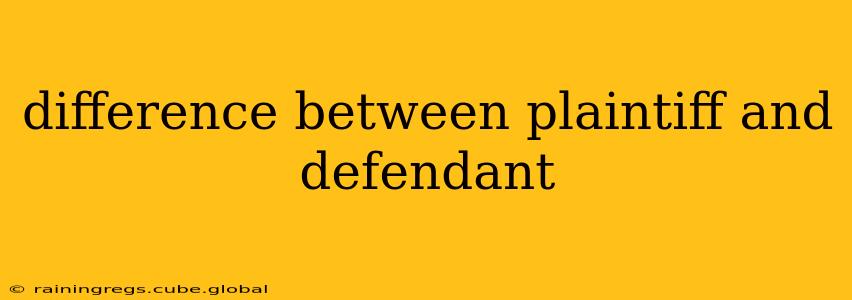Understanding the roles of plaintiff and defendant is crucial for anyone involved in, or simply curious about, the legal system. While seemingly simple, the distinction between these two crucial parties shapes the entire legal process. This article will clarify the difference, exploring their respective responsibilities and the implications of each role.
What is a Plaintiff?
The plaintiff is the individual or entity who initiates a lawsuit. They are the party who believes they have been wronged and are seeking legal redress. Think of the plaintiff as the person bringing the complaint or claim. They file a lawsuit against the defendant, alleging a specific violation of their rights or a breach of contract, and presenting evidence to support their claims. The plaintiff bears the burden of proof, meaning they must convince the court that their claims are valid.
What is a Defendant?
The defendant is the individual or entity against whom the lawsuit is filed. They are the party accused of wrongdoing. The defendant is required to respond to the plaintiff's claims, either admitting or denying them. They will present their own evidence and arguments to defend themselves against the allegations. The defendant's role is to refute the plaintiff's claims and avoid liability or damages.
What are the Responsibilities of a Plaintiff?
- Filing the Complaint: The plaintiff initiates the legal process by filing a formal complaint with the court, outlining the facts of the case, the legal basis for the claim, and the relief sought (e.g., monetary damages, injunction).
- Providing Evidence: The plaintiff is responsible for gathering and presenting evidence to support their claims. This might include documents, witness testimony, and expert opinions.
- Burden of Proof: The plaintiff carries the burden of proving their case to the court's satisfaction, usually by a "preponderance of the evidence" in civil cases, meaning it's more likely than not that their claims are true. In criminal cases, the burden of proof is much higher ("beyond a reasonable doubt").
- Participating in Discovery: The plaintiff must participate in the discovery process, which involves exchanging information and evidence with the defendant.
What are the Responsibilities of a Defendant?
- Responding to the Complaint: The defendant must file a formal response to the plaintiff's complaint, either admitting or denying the allegations. Failure to respond can result in a default judgment against the defendant.
- Presenting a Defense: The defendant presents their version of events, provides evidence to support their defense, and counters the plaintiff's arguments.
- Participating in Discovery: Like the plaintiff, the defendant must participate in the discovery process, providing information and evidence to the plaintiff.
- Attending Court Proceedings: The defendant must appear in court for hearings, trials, and other proceedings as required.
What Happens if the Plaintiff Loses?
If the plaintiff fails to prove their case, the court may dismiss the lawsuit. The plaintiff may bear the costs associated with the litigation. They may also face sanctions if their case is deemed frivolous or without merit.
What Happens if the Defendant Loses?
If the defendant is found liable, they may be ordered to pay monetary damages to the plaintiff, or they may be subject to other court orders, such as an injunction to stop a certain behavior.
Can someone be both a plaintiff and a defendant?
Yes, absolutely. In many cases, a person might be a plaintiff in one lawsuit and a defendant in another, or even both simultaneously in the same case (e.g., a counterclaim). A classic example would be a car accident where both drivers sue each other for damages.
What is the difference between Civil and Criminal Cases?
This article focuses on civil cases. In criminal cases, the plaintiff is the state (or federal government) and the defendant is the accused individual. The standards of proof are different, and the potential penalties are also significantly different.
This explanation should provide a solid understanding of the fundamental differences between a plaintiff and a defendant. However, the specifics of each case will vary depending on the jurisdiction and the nature of the legal dispute. For advice on a specific legal matter, always consult with a qualified legal professional.
